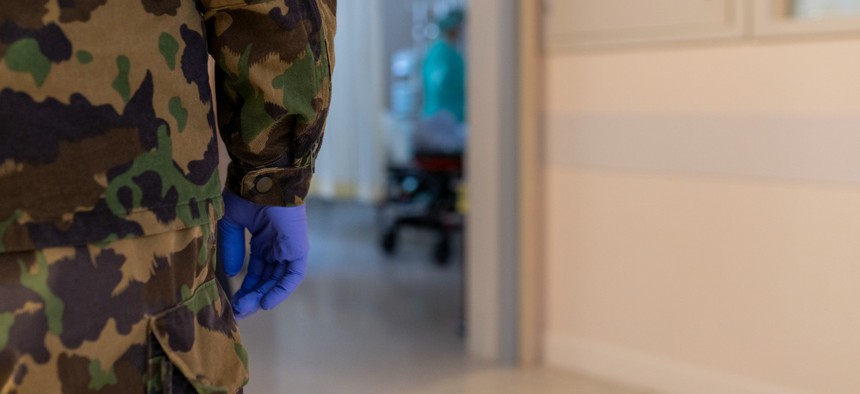
Cavan Images / Getty Images
Congress Closes in on a Nearly $7B Investment in the VA Workforce and New Facilities
Pay raises, student loan repayment and new recruiting tools are part of the sweeping package as lawmakers prepare VA for a surge of new patients.
Congress is growing closer to passing a measure to expand benefits offered to veterans who became sick after exposure to burn pits while on active duty and to authorize sweeping new authorities to hire and keep employees to handle the resulting uptick in usage of the government health care system.
The Senate has queued up a vote next week on the Honoring our Promise to Address Comprehensive Toxics (Honoring Our PACT) Act (H.R. 3697), which would presume, for the purposes of eligibility for care at the Veterans Affairs Department, that 23 respiratory illnesses contracted by veterans are related to burn pits used in the military. The measure has bipartisan support after Senate leaders reached a breakthrough agreement last month and the House has already passed a similar bill. Veterans advocates estimate millions of veterans could potentially become newly eligible for VA care under the legislation, leading lawmakers to include in the measure provisions to boost hiring, recruiting tools, pay and bonuses.
The bill has been years in the making, as advocates and some lawmakers have pushed for recognition that exposure to the fires the military has used to dispose of toxic and other wastes causes cancer and other illnesses. All veterans claiming related illnesses would have access to new exams at VA, which would establish a working group on how the department will handle toxic exposure claims going forward.
The measure is set to authorize leases for 31 new medical facilities at VA to help accommodate the expected surge in patients, which is expected to cost nearly $1 billion. The Congressional Budget Office found the slew of pay and other human resources changes would come with a $5.7 billion price tag over the next decade. The initial House version of the bill did not include the personnel reforms, but House lawmakers introduced separate legislation on Thursday with many of the same provisions.
The bill would authorize the department to buy out the contract of health care professionals to recruit them to VA, so long as they make a four-year commitment to the department. VA would have $40 million per year for the buyouts. VA’s health care employees would be eligible for pay boosts worth 50% of their base salaries, up from the current cap of 30%. Overall pay would be capped at level two of the Executive Service pay scale, which is currently $203,000 per year. VA Secretary Denis McDonough has called lifting the pay caps essential for VA’s recruiting and retention efforts and has aggressively pushed Congress to pass the reform.
The measure would waive pay caps for any employees whose facility closes, potentially creating widespread use of retention incentives as VA is in the midst of an effort to close or consolidate hundreds of medical centers and clinics around the country. It would also waive the caps for employees providing care to burn pit victims. McDonough has implemented initiatives to boost eligibility for child care subsidies, increase retention incentives and create new career paths that will lead to more opportunities for promotions and raises.
The bill would waive the overall bonus cap of $360 million currently set for VA for the next two years. It would make the process easier for doling out recruitment and retention incentives and allow for pay bumps for employees with critical skills. It would also authorize VA to pay up to $100,000 for an employee’s student loan repayments and to hire recent graduates on an expedited basis.
Under the bill, VA would create a rural recruiting strategy in consultation with each medical center and outpatient clinic. The department would have to work with the Office of Personnel Management to establish qualifications for every human resources professional and standardize performance metrics for them. The measure would limit requirements for applying veterans preference for housekeeping aides, which House lawmakers called “one of the most understaffed and hardest to hire positions in VA facilities across the country.”
The Senate was originally slated to vote on the bill on Thursday, but delayed final passage until next week as it irons out the amendment process. President Biden has already praised the bill and encouraged lawmakers to act expeditiously to pass it. Biden has speculated his son Beau, who died from brain cancer after serving overseas near burn pits, was impacted by toxic exposures.







